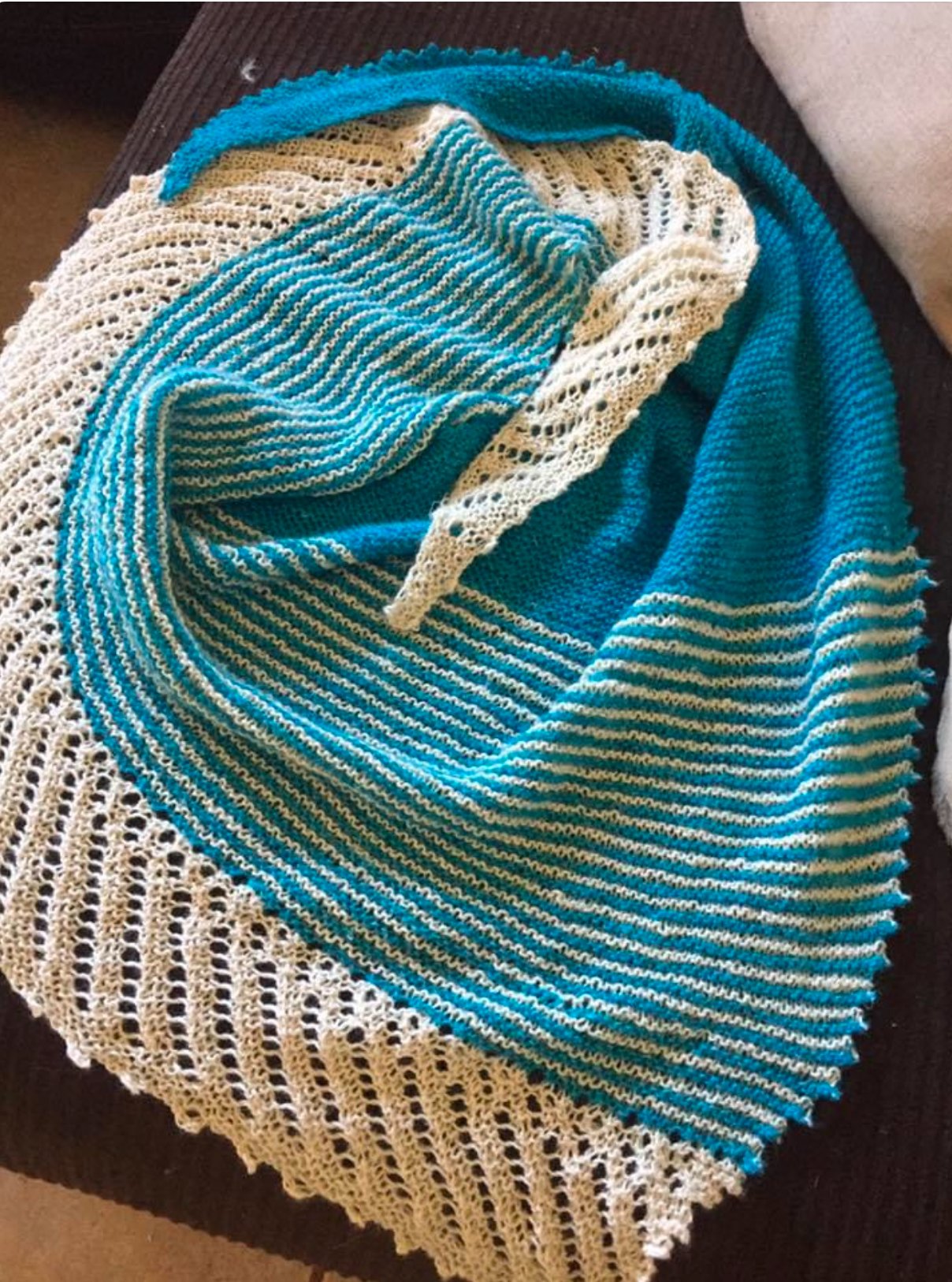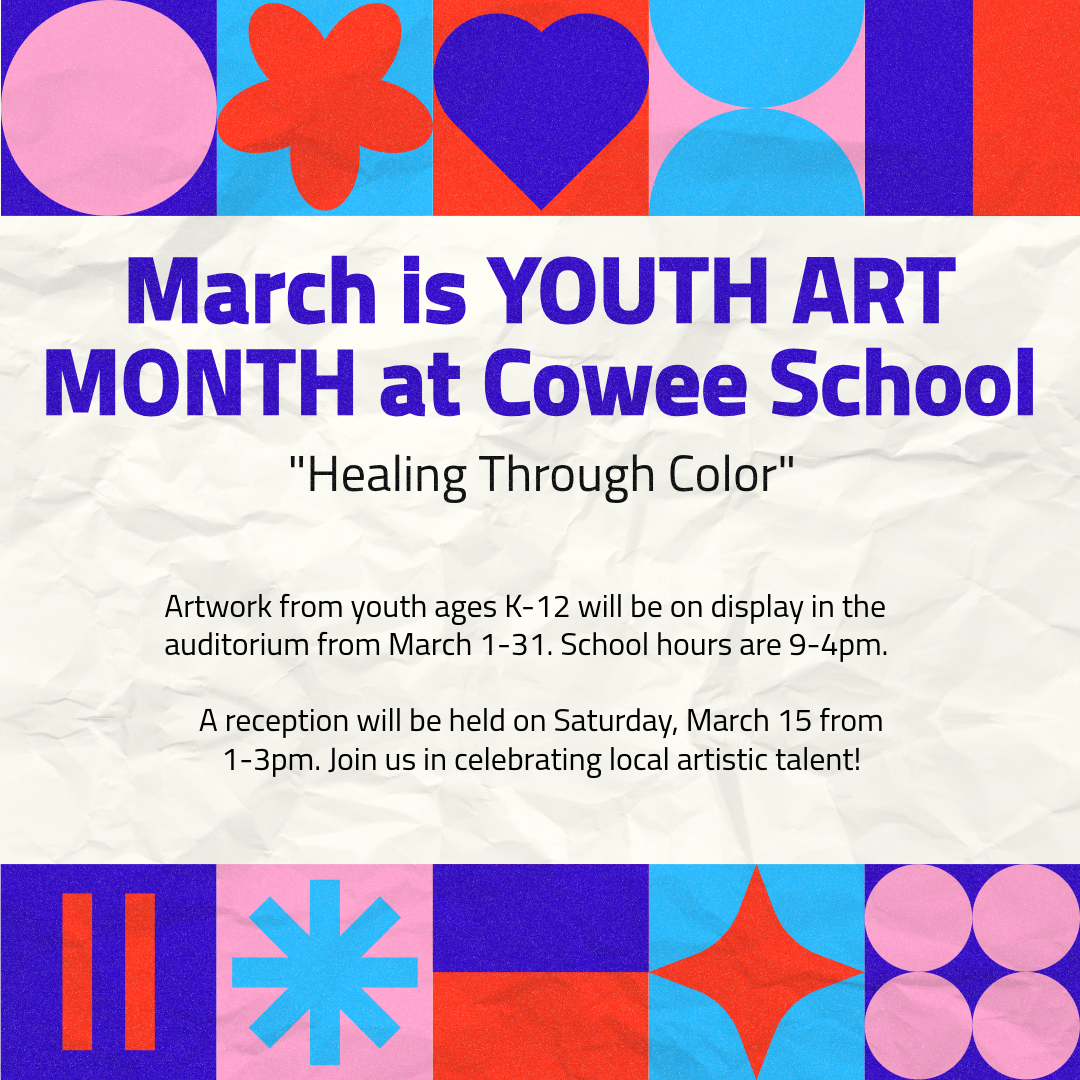
Upcoming events
Recurring Events
Fit & Fun Exercise Class - Every Monday, Wednesday, Friday at 9:30am
Where We Live: History, Nature and Culture Speaker Series - Every Third Monday at 6:30pm
Open Mic Night - Every Second Friday at 6pm
Free Community Art Days - Quarterly



Bark Basket Class
Registration begins April 1st and is free. May 2nd class is limited to 6 students.. Please call the school to register 828/369-4080 M-F 10-2 and ask for Gayle.

Bark Basket Class
Registration begins April 1st and is free. May 3rd class is limited to 8. Please call the school to register 828/369-4080 M-F 10-2 and ask for Gayle.

















Youth Art Month Reception
Youth Art Month is a celebration of the visual arts that began as Children’s Art Month in 1962 through The Crayon and Watercolor Institute (now Art and Creative Materials Institute, or ACMI). Today, the Council for Art Education (CFAE) administers the program at the national level and showcases the positive impact and association between art teachers and students at the K-12 level. The month-long celebration emphasizes the positive influences of visual art education not found in standard core curriculum subjects. Art shows, special exhibits, fundraisers, and school and community activities take place annually, traditionally during March. The theme this year is “Healing Through Color”.
Since 2019, the Macon County Art Association has invited the Macon County art teachers in grades K – 12 to select student artwork for a YAM exhibit at the Uptown Gallery. This year the homeschool students have been invited to participate and with the expanded show, it has been moved to Cowee School Arts and Heritage Center in the auditorium from March 1 – 31. A reception will be held on Saturday, March 15 from 1:00 to 3:00 p.m. that is open to the public with refreshments served. The Arts and Heritage Center is open from 9 – 4 p.m. Monday through Saturday.
On the radio show, “Citizens Making a Difference”, Gordon Mercer will be interviewing individuals involved to explain more about the impact the arts make on students. It will be broadcast on Saturday, February 22, at 8:00 a.m., on WFSC – 104.9 FM, WNCC – 104.1 FM, and 1050 AM.
Also in Highlands, in celebration of YAM, Stephanie Hudson, art instructor at the Highlands Schools, will have her student’s artwork, both 2-D and 3-D, on display at the Hudson Library.










Jon Shain & Piedmont Blues
Hailing from Durham, NC, Jon Shain is a veteran singer-songwriter who’s been turning heads for years with his words, his fiery acoustic guitar work, and his evolved musical style – combining improvised piedmont blues with bluegrass, swing, and ragtime. Jon has released nine solo albums to date, along with two albums with duo partner FJ Ventre, a Jon Shain Trio live album, and one album of co-writes with Joe Newberry. Shain’s newest album, Restless Soul Syndrome, recorded at Good Luck Studios this past year, will be released April 9, 2024. Shain is also the author of the music books Gettin’ Handy With the Blues – a Tribute to the Legacy of W.C. Handy and Jon Shain’s Fingerstyle Guitar Method, both published by Mel Bay Publications. In 2019, Shain won the International Blues Challenge in Memphis, TN in the solo/duo category.
Over the last several years, Shain has headlined listening rooms both as a solo and with duo partner FJ Ventre throughout the US and he's done two solo tours in Europe. He has opened shows for John Hiatt, Keb’ Mo’, Little Feat, and many other roots legends. When Shain is not recording, producing other artists, or performing, he stays busy giving private instruction in guitar, and teaching group workshops in songwriting and blues guitar.
FJ Ventre began playing music with Jon in 1982 when they met in high school and have developed a brotherly connection that continues to this day. Ventre went to University of Massachusetts-Lowell, earning a B.A. in Music Performance and Sound Recording and remained for some time in the Boston area, performing in the city's vibrant music scene. Since relocating to Chapel Hill, NC in 2000, Ventre has performed with his own group The Swang Brothers, as well as with Chris Stamey, Wes Collins, Huzzah, and a who's who of NC music groups. In addition to being a sought-after bassist, Ventre spends his time behind the mixing board, producing and engineering at his own Good Luck Studio as well as writing his own songs.

Beginner Knitting Class
Starting January 25th and going through February 15th (4 classes total) on Saturdays 10am-12pm at the Cowee School. This class is free, but limited to 10 people. Pattern, yarn, knitting needles and online tutorial and written material to be provided. Please call the school (828/369-4080 and ask for Gayle) to register.
This class is geared to those who have no previous experience with knitting. Come learn this ancient art at your own pace. There will be one-on-one help and support as needed during class. Outside of class you will have access to a tutorial to refresh your memory on what was taught in class.

Where We Live Speaker Series
Reptile and Amphibian Conservation in the Appalachian Highlands
On Monday, January 20 at 6:30 pm, the series "Where We Live: History, Nature and Culture" will present a program on snakes and other reptiles and amphibians in our area.
Appalachia is home to a stunning diversity of reptiles and amphibians, and ensuring their survival is essential to the health and future of this iconic region. From the sunlit rock outcrops where Timber Rattlesnakes bask, to the clear, cool streams where Hellbenders hide beneath river stones, these species are vital to the ecological balance of the Appalachian Highlands. Dr. Jenkins will offer an engaging overview of The Orianne Society’s efforts to conserve these remarkable creatures. Along the way, you'll learn about the crucial role reptiles and amphibians play in Appalachian ecosystems and discover how conservation efforts are working to protect them for generations to come.
The speaker, Dr. Chris Jenkins, is a wildlife biologist with extensive experience in conservation research and applied ecology. He earned his B.S. and M.S. degrees from the University of Massachusetts, specializing in wildlife biology and wildlife conservation, respectively, before completing his Ph.D. in biological sciences at Idaho State University. Over the years, Dr. Jenkins has worked for leading organizations such as the Wildlife Conservation Society, the U.S. Forest Service, U.S. Fish and Wildlife Service, University of Massachusetts, University of British Columbia, and National Geographic.
His current research focuses on land protection efforts in Longleaf Pine ecosystems, the ecology and conservation of Timber Rattlesnakes, and Giant Tortoise conservation. Dr. Jenkins founded and served as the first chair of the IUCN Viper Specialist Group and has held leadership roles in several key conservation organizations, including Partners in Amphibian and Reptile Conservation, Backcountry Hunters and Anglers, and the Indian Ocean Tortoise Alliance.
The program will take place at Cowee School arts and Heritage Center at 51 Cowee School Drive in Franklin.





Where We Live: History, Nature and Culture Speaker Series
Where We Live: History, Nature, and Culture---More than Memories - Why Historic Districts Matter
On Monday, November 18, at 6:30 pm, the speaker series “Where We Live: History, Nature and Culture” will present the program More Than Memories-Why Historic Districts Matter by Stacy Guffey.
By taking an in-depth look at the Cowee-West's Mill Historic District in northern Macon County, we'll discover why historic structures and historic districts improve our area's social and economic health.
The district, designated by the National Register of Historic Places in 1999, includes the archaeological site and mound of the Cherokee town of Cowee, a major settlement until the time of the Revolutionary War. In the first half of the 19th century, the area became a thriving agricultural community, during which time many of the historic structures were built , including Rickman’s General Store, the predominately African American Pleasant Hill Methodist Church, and Cowee School. During the late 1800s and early 1900s, it became the largest African American community west of the Balsam mountains.
Stacy Guffey is a Macon County native who has grown into leadership in business and public life in the region his family has called home for generations. A graduate of Franklin High, Western Carolina University, and holding a Master’s in Public Administration degree from the University of North Carolina, Stacy served as Macon County’s planner from 2004 to 2009. He helped establish and run the Arts and Heritage Center at the old Cowee School while working as a regional planning and economic development consultant. Currently, he serves as the Senior Program Manager for NCGrowth at UNC Chapel Hill providing technical assistance for small businesses and local governments in the 17 western counties of North Carolina. He took on a new role in Downtown Franklin’s preservation efforts with the purchase and rehabilitation of the 1897 building that contains the Scottish Tartans Museum. Stacy serves as the Vice Mayor of Franklin.
The program will take place at Cowee School Arts and Heritage Center at 51 Cowee School drive in Franklin. Please join us for an informative and pleasant evening.



Where We Live: History, Nature and Culture Speaker Series
On October 21 at 6:30 p.m., the Cowee School Arts & Heritage Center series, “Where We Live: History, Nature, and Culture” will present a program by Teresa Bouchonnet on “The Cultural Significance of Millinery as a Women’s Profession in WNC”.
Hat-making was more than just a craft; it allowed women to express their creativity and contribute to their households. The skills required for millinery were often taught within families. Teresa is a native of Macon County. Her Grandmother Allen & her mother both made their own hats using material to coordinate their church outfits like many women of that period.
A variety of hats showing different periods and styles including wooden hat blocks used to make hats will be displayed. Teresa will also give a tour of her studio, Cowee Textiles/Cowee Millinery, after the talk, for anyone interested in seeing items she uses to create her one-of-a-kind hats. Her studio has been located at the Cowee School Arts & Heritage Center since 2013. She is a fourth-generation textile artist accomplished in many styles including millinery/hat making. She has just returned from an international Millinery Meet-Up with hat makers from all over the world. Hats are making a bold return per Harper’s Bazaar June/July 2024 issue.
This tradition of hat-making is a testament to the resourcefulness and creativity of the women in WNC, reflecting a broader narrative of resilience and ingenuity in Appalachian culture.
You are invited to bring examples of old hats to add to the display in the gym.
The program will be held at Cowee School Arts and Heritage Center at 51 Cowee School Drive in Franklin at 6:30 pm. The series is designed to give people an opportunity to learn more about our local area, from many different angles, and to enjoy a pleasant, informative evening together. Come join us!






















